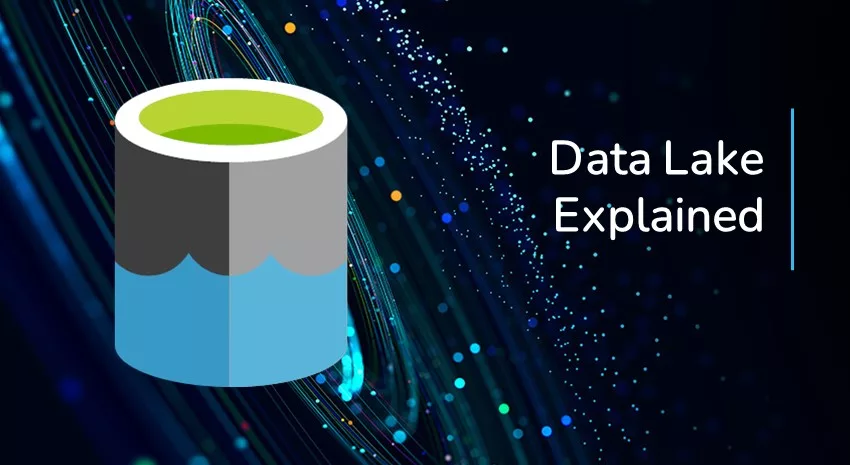What is a Data Lake? 11 Ways Even Small Businesses Can Benefit from Them

When you hear “data lake”, like most, you assume that would interest only a large enterprise with tons of data to manage. While it’s true that data lakes are very beneficial in these cases, you might be surprised to know that businesses of ANY size can benefit from a data lake and that adopting them can be easier and more cost-effective than other approaches. In this blog, we briefly define a data lake, how it differs from a data warehouse, and the benefits they offer…even to small businesses.
What is a data lake?
A data lake is a central location where you can collect and store raw, unstructured data, which means the data remains unaltered and retains all its original attributes. Data lakes can accept data from many sources, such as IoT devices, mobile apps, and social media, and store data in any form, including images, audio files, XML, and PDFs. The concept is illustrated by multiple “streams and rivers” of information from various data sources feeding a central “lake” of data.
The important difference between data lakes and data warehouses–and why it’s an advantage
A data warehouse database has a predefined data structure and schema optimized for SQL queries. The data is cleaned and modified for storage in a relational system.
Data lakes store both relational and non-relational–also called unstructured–data. No data schema is defined when the data is captured. Retaining all the original elements available when the data was captured without altering the original parameters offers several advantages that ultimately contribute to the benefits of using data lakes:
- Access to raw, non-relational data is valuable to data scientists, developers, or anyone needing to analyze it because it enables them to look for nuances that might not have appeared to them in the past. It enables true, predictive analytics.
- Storing raw data in a central data lake gives all stakeholders within your organization access to the same information, eliminating the temptation to create data silos by reproducing the data into separate databases, a common problem for all businesses.
- Raw data is much more helpful in machine learning, predictive analytics, and profiling applications.
Data lakes offer some powerful benefits to businesses of ALL sizes. Here are 11 of them:
Even if you’re a smaller business, you’ll be amazed at the benefits of going with a data lake because of its unstructured nature. Data lakes:
- Facilitate real-time decision-making – Real-time access to the body of the raw data collected allows users to generate their queries and make informed real-time decisions.
- Support multiple languages and technologies – Data lakes support SQL and several other languages and technologies for deep data analysis.
- Are highly scalable – Data lakes are highly scalable, much more than data warehouses, so getting one now will set your company up for future growth.
- Are very flexible – Data lakes also offer much more flexibility around data queries than data warehouses.
- Offer more analytics options – Data lakes give members of your organization, including business analysts, developers, and data scientists, access to the same data repository. These individuals can use their choice of data analysis tools, from the open-source options of Hadoop, Presto, and Spark, to proprietary offerings from vendors like Microsoft and AWS, to look at the data differently.
- Make it easier to use Machine Learning (ML) capabilities – Data lakes can store vast amounts of historical data. It is useful for building models that machine learning algorithms use to create forecasts and return suggested actions that produce optimal results.
- Provide deeper customer insights – By combining data from multiple sources, such as CRM, website, social media, customer buying history, marketing platforms, and incident reports, companies of any size can more easily build comprehensive models of their customers to identify the most profitable potential customer, optimize product promotions, and understand the reasons for churn.
- Improve product innovations – Data lakes prove invaluable to research and development teams, allowing them greater latitude to collect and analyze data from multiple sources for various applications, leading to improvements in areas as diverse as structural materials, pharmaceuticals, chemicals, engine designs, and more.
- Help optimize processes – Leverage the information from your business applications and devices to plot multiple data points across the organization with machine-generated data using the Internet of Things (IoT). Data lakes can help you increase productivity, reduce operational costs, and optimize processes.
- Can handle anything structured data can – While structured data, produced by standard transactional systems and business applications, is useful for batch reporting, business intelligence, and visualizations, you don’t lose that benefit because data lakes offer the same capabilities.
- Are more affordable than data warehouses – This might be surprising, but data lakes are a much less expensive alternative because data warehouses, while providing fast query results, require more expensive storage options.
Interested in discovering how a data lake can help you and your next steps? Talk to ArcherPoint
Businesses maintain their competitive advantage by utilizing their data. Data lakes help capture the maximum amount of data to perform that analysis. Companies using Business Central come in nearly all shapes and sizes, so if your company needs greater access to the data available, data lakes could be a viable option. Learn about Microsoft’s Azure Data Lake tools and technologies. When you’re ready to discuss your data needs, issues, and goals, contact ArcherPoint to discuss how a data lake can work for you. We can help you with your strategy and get a data lake into your architecture when the time comes.
Trending Posts
Stay Informed
Choose Your Preferences
"*required" indicates required fields
